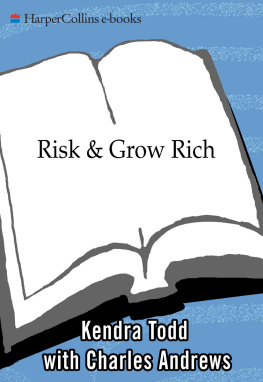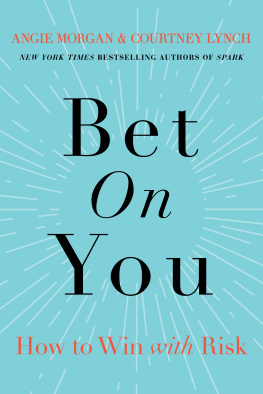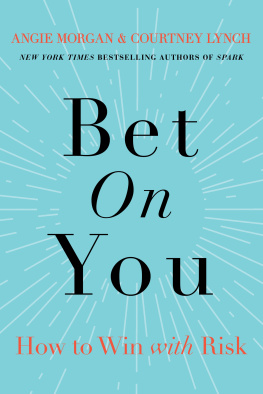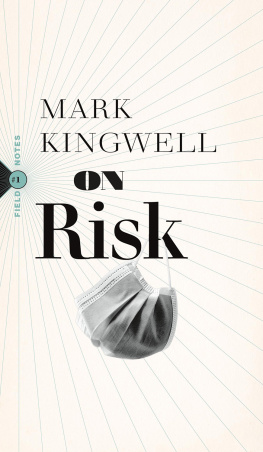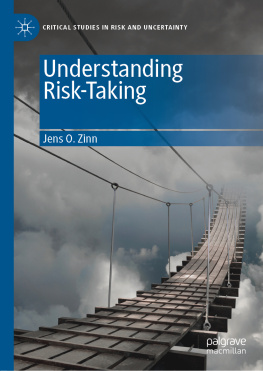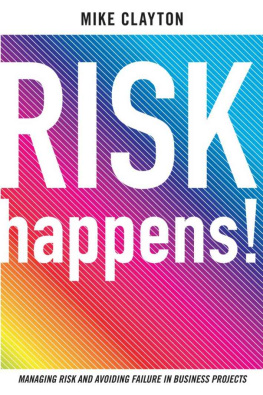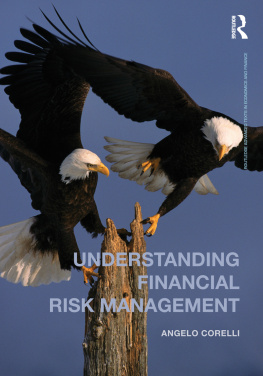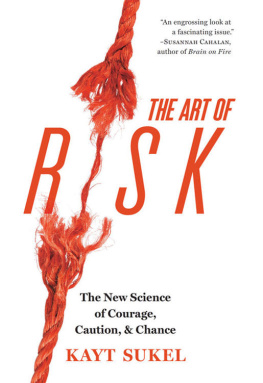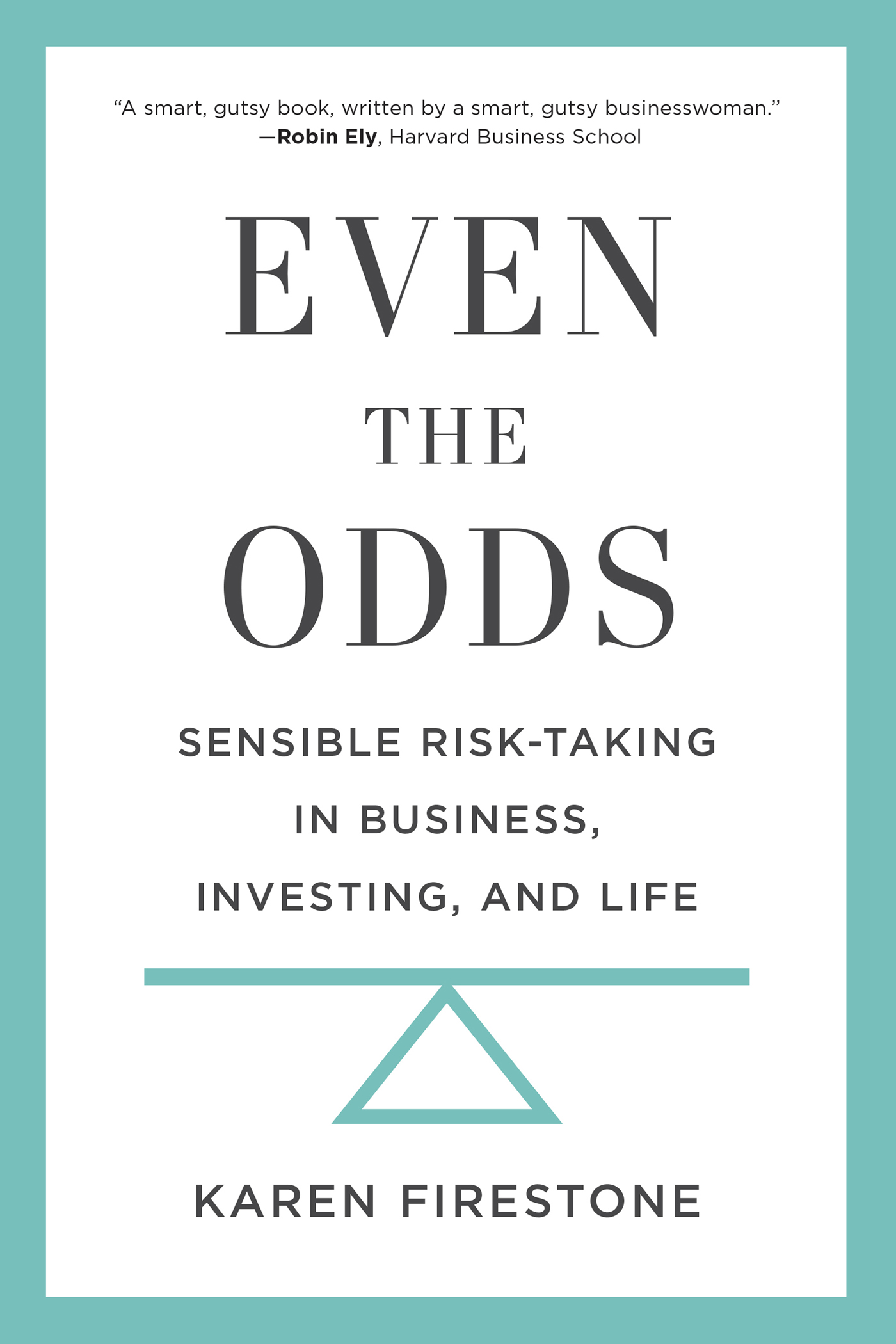First published by Bibliomotion, Inc.
All rights reserved. No part of this publication may be reproduced in any manner whatsoever without written permission from the publisher, except in the case of brief quotations embodied in critical articles or reviews.
Names: Firestone, Karen, author.
Title: Even the odds : sensible risk-taking in business, investing, and life / Karen Firestone.
Description: First Edition. | Brookline, MA : Bibliomotion, 2016.
Identifiers: LCCN 2016004362| ISBN 9781629560984 (hardback) | ISBN 9781629560991 (ebook) | ISBN 9781629561004 (enhanced ebook)
Subjects: LCSH: Decision making. | Risk. | BISAC: BUSINESS & ECONOMICS / Decision-Making & Problem Solving.
Praise for
Even the Odds
and Karen Firestone
Risk is everywhere, and we all need to manage it wisely. This book teaches you to manage risk as a highly proficient and articulate investment professional does. Karen Firestone shares her copious experience in a series of useful and engaging examples.
Ben Shapiro, Malcolm P. McNair Professor of Marketing, Emeritus, at the Harvard Business School
There is no other book like Even the Odds. It is a must-read for every MBA student launching a career and every midcareer professional contemplating what is next. This book spans risk/reward tradeoffs with uncommon candor, clarity, and cleverness. It blends Warren Buffets wisdom with the engaging personal appeal of Oprah Winfrey. Written by one of the worlds most successful and witty money managers, this book adroitly navigates the opportunities in the turmoil of markets and money as well as in the complexities of love, family, and community life. Unlike the biographical reflections of most CEOs and public officials, Firestone reveals missteps showing the lessons of resilience and how to detect dangerous mischief of others.
Jeffrey A. Sonnenfeld, Senior Associate Dean for Leadership Studies, Lester Crown Professor of Leadership Practice, Yale School of Management and author of Firing Back and The Heros Farewell
Even the Odds is an eloquently written exploration of multiple facets of risk. By mixing risk management theory, business anecdotes, and her personal life story, Karen Firestone has created a highly readable book on a subject relevant to everyone.
Lord Adair Turner, former Chairman of the UK Financial Services Authority and author of Between Debt and the Devil
Karen Firestone has produced a very thoughtful, articulate, and eminently readable book on how to think creatively about risk and deal with our uncertain world. I particularly enjoyed her anecdotes and vignettes on specific case studies of both personal and financial risk-taking, which include her blunt assessment of both successes and mistakes. She is persuasive in providing examples of how a more systematic assessment of risk might lead to better decisions and outcomes.
Edward H. Ladd, Chairman Emeritus and CFA, Standish Mellon Asset Management
Even The Odds: Sensible Risk-Taking in Business, Investing, and Life is Karen Firestones experience utilizing her personal courage and critical analytical sense to navigate through the riptides of the waters of billion dollar investments, take on the risks inherent in becoming CEO of an investment firm at the height of one of the nations most historic financial collapses, and now help guide others through the uncertainties of their own risks.
Peter Gammons, writer, journalist, and analyst at the Major League Baseball Network
Karen Firestone has brilliantly navigated market risk for many years. In Even the Odds, she offers us the gift of her clarity and pragmatism in assessing that risk. By showing us how to ask the right questions and unearth potential pitfalls, this book offers wisdom about how to pursue our dreams without losing our shirtsor our mindsin the process. A smart, gutsy book, written by a smart, gutsy businesswoman.
Robin Ely, Diane Doerge Wilson Professor of Business Administration, Senior Associate Dean for Culture and Community, Harvard Business School
To David
I am a practitioner in the risk trade. You are too. Every day we face challenges that deal with exposure to uncertainties that range from benign to highly dangerous, from immaterial to very costly. We might nudge our car too aggressively into traffic at a busy intersection, interrupt a colleague in a meeting to make a controversial point, impulsively invest in a friends start-up against our own better judgment, or decide to eat a loaded cheeseburger and secretly delight in the fact that we werent offered a salad rather than fries.
The possible outcomes following these actions vary enormously, from a car accident and heartburn to financial debacle or a pleasant drive home, yet they illustrate the range of our daily risk-related experiences. Very often, we barely register the potential downside, and even when we should evaluate the situation carefully, our effort can be hopelessly inadequate.
My day job involves constant encounters with the unpredictable. My company invests money and manages the financial welfare of clients who trust us enough to pay for our expertise in making tough investment choices for them. We make our living by successfully analyzing risk and subverting the many factors that may bring our clientele tremendous financial pain. The practical focus of this book is directed toward constantly pursuing strategies of sensible risk-taking, to improve the outcomes of decisions and to add real value.
Other than a break to attend business school, I have spent my entire adult life in the investment business assessing risk. The stock market fascinated me from the time I was in fifth grade, when Mrs. Culhane had our class create a model portfolio that we followed and charted through the course of the year, keeping track of our gains and losses. IBM, Xerox, Kerr McGee, United Aircraft (now Technologies), and Eastman Kodak made up that 1967 portfolio. I sold United Aircraft and bought Flying Tiger and replaced Eastman Kodak with Avon. Those were the go-go years and we all made a killingon paper. I suspect that Mrs. Culhane was playing the market actively herself.
I attended the Commonwealth School, a private high school in Boston, where I had a substantial scholarship thanks to the largesse of the schools founder and headmaster. His name was Charles Merrill, and his father, Charles E. Merrill Sr., had cofounded Merrill Lynch. I asked Mr. Merrill to help me get a job at Merrill Lynchs office in Copley Square, close to the school. A devout liberal, Mr. Merrill put his head in his hands and shook it so vigorously that I was worried he was having a seizure. Finally, he looked up at me and said yes, he would arrange an interview with the branch manager, Bill Strott, with one important condition: I must promise never to become a capitalist. Given that I didnt really understand the term at age sixteen, I agreed. (I have since apologized to Mr. Merrill for breaking the promise I made all those years ago.) The next day, there was a note for me on our bulletin board from Charlie Merrill. It said, See Bill Strott at 3:30 p.m. tomorrow. WEAR A SKIRT!!! I did, and Mr. Strott, who doubtless had little choice, hired me to do whatever menial tasks they needed done around the office. That was my first paid job in the investment business. I was in heaven.


